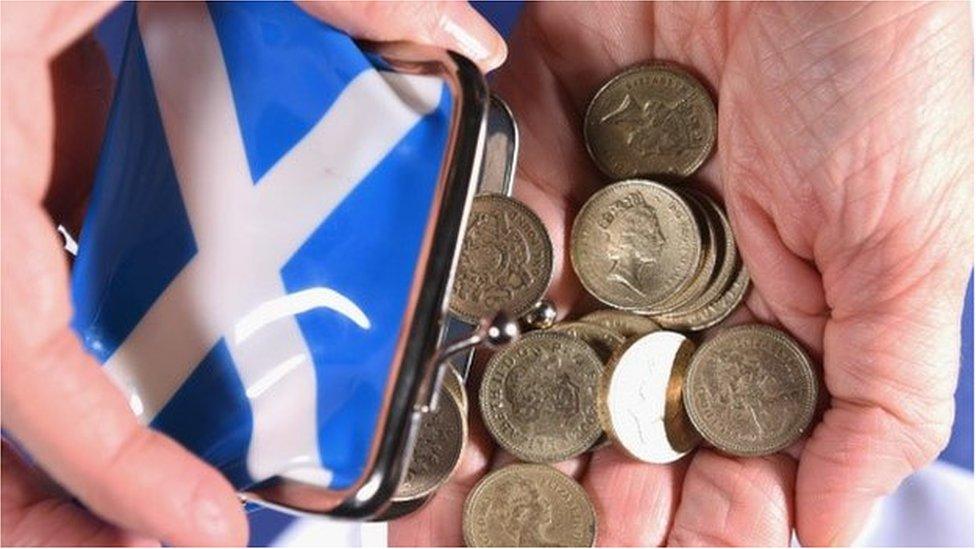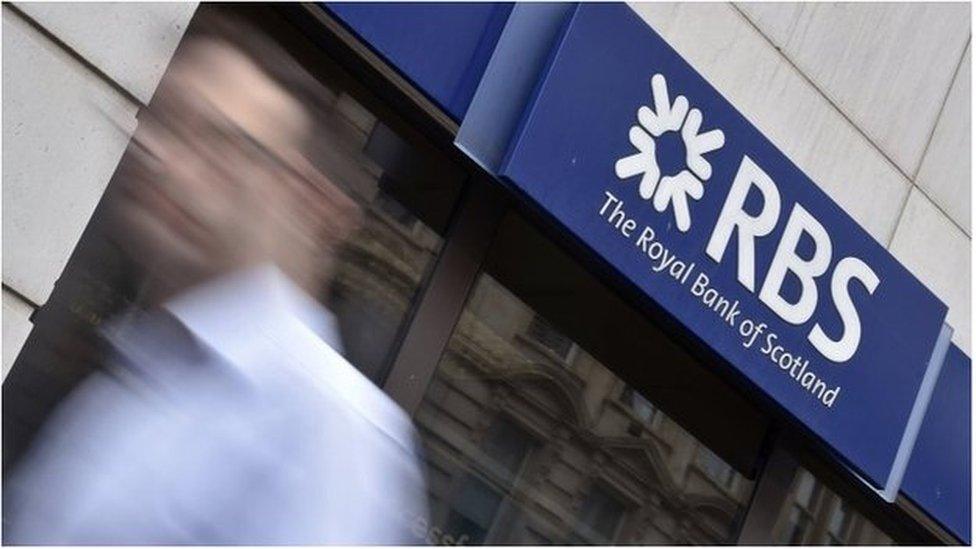Rebooting the economics of independence
- Published
The Scottish independence debate is back. For some, it never went away.
The vote on 23 June, for Britain to leave the European Union put independence "on the table", according to Nicola Sturgeon.
As with so much about the aftermath of that vote, it's not clear what that means.
But it's clear that the document the current First Minister puts on the table will have to be different from Alex Salmond's white paper.
The economic questions are familiar - around the currency of choice, and linked to that, around central banking, government debt and banking.
The economics of oil have changed, with big implications for the affordability of Scots' public spending ambitions.
The economic questions extend to European Union membership, which is perhaps the most obviously changed issue since UK voters chose to leave.

Having put independence back on the table, it is an invitation to debate what the answers will be. Yet nearly two years after the No result, that debate has barely begun.
It probably didn't help that the SNP's Stewart Hosie was the man playing the lead role in co-ordinating a summer reboot of the independence campaign, until his complicated personal life torpedoed his deputy leadership of the party.
Sterling peg
George Kerevan, the SNP's East Lothian MP, offered his view a month ago, external that an independent currency is do-able, and has become desirable. Pegged to sterling, he foresees five years of public spending pain in order to gain a big boost to productivity.
How will that happen, and how certain can Scotland be of achieving that transformation? That will have to wait for Mr Kerevan's next article. It was never very clear from the 2014 debate.
Alex Neil, the ex-cabinet minister and ex-leadership contender, has issued a blunt warning to fellow enthusiasts for independence that they need to pick their time carefully before moving to a second referendum.
Partly that is because the consequences of Brexit are so unclear as they impact on Scottish access to the single market. The Lanarkshire MSP warns, in an article in Holyrood magazine, external, of the impact of a "hard border" between Scotland and England, if the southern neighbour is out of the EU while the northern one remains in. Neil suggests that may require Scotland to avoid full membership as it's conventionally conceived.
The economic challenges look daunting, if you read Mr Neil: "We need to convincingly address the fiscal position of an independent Scotland, our currency plans post-independence, the impact of the recent dramatic fall in oil prices and the need for a more ambitious plan for transforming the economic and social life of Scotland. To hold a referendum before all these issues are addressed would be a high risk strategy."
Tax hike
Others, more or less connected to the SNP, are weighing in. Former justice minister Kenny MacAskill is now out of the Scottish Parliament and free to say what was unsayable, external - that higher taxes are necessary to meet the objectives of (most of?) those who support independence, and that it cannot just be high earners who take the brunt of that.
The Common Weal, the pro-independence, radical left group, suggests a ScotPound could be created. Money would be printed and and distributed with a bias to supporting those struggling from economic disadvantage. The bond markets might not be impressed by that approach when the Scottish government seeks out funding.
Over the weekend, I was able to quiz both a former governor of the Bank of England, and the current chief executive of Royal Bank of Scotland.
At the Edinburgh International Book Festival, Lord Mervyn King was setting out quite radical warnings about the state of the economy. He was emphasising a point his successor has made, that monetary policy cannot solve current problems, and that governments have to play a more active part.
In his book, The End of Alchemy, the former governor argues that co-ordination by central banks and governments has to iron out continuing huge imbalances in the world economy. But that would require measures on which it looks extremely difficult to get agreement about both outcome and timing.
Having tried to figure out a way of lowering the strength of sterling for the past 16 years, he quotes his Finnish wife on the morning of 24 June, saying that something he had spent years trying to achieve had been delivered by the electorate in one day.
And then there was independence. The former bank governor's view is that an independent Scotland would have the obvious option in favour of use of the pound, while accepting that all control over it and the Bank of England remains under current Westminster law.
Under that plan, Scotland would have no control over monetary policy. And without a lender of last resort (or what he would prefer - a central bank "pawnbroker of last resort"), large banks would have to move their licences and head office operations.

RBS diminished
That much was confirmed by Ross McEwan of Royal Bank of Scotland. In a long interview with me in Inverness, the chief executive was sanguine about the uncertainty that Brexit has brought for his customers and the years of transition that lie ahead.
He said the Royal Bank's investment this year is down as a result of the slowdown, but it's still running at £1.1bn per year.
Saying as much makes sense, coming from someone who's job is to encourage customers to take risks by the tens of billions. Even if he thinks it, he was hardly going to say that the economy's in dire trouble.
The same could be read into his comments on Scottish independence. I asked if the renewed debate about independence would change the Royal Bank's approach to it.
The answer was no. He didn't leave any doubt that the bank would move its registered head office out of Scotland, not only because it would need the backing of a central bank, but because RBS would be "too big for Scotland". And that's even in its much diminished shape, cut down to a customer base in the UK and Ireland.
As before, jobs would stay in Scotland, because that's where the RBS has recruited and developed the skills it needs. But the brass plaque would move.
Headless quarters
Does that matter? Removing the government risk of having to bail out a very large bank can be seen as welcome.
Some senior jobs could be expected to move with the registration. The number depends on the conditions laid down for registration by a separate rest-of-the-UK state.
It matters beyond that, too. Head offices are important to the economy. They tend to have the highest paid jobs. They generate business in support services, such as accountancy and legal advice.
They can make the key decision-makers more committed to, and conscious of, the impact on the communities in which they live and operate.
So Scotland can't afford to be complacent about losing headquarters operations, either for regulatory reasons, as in banking, or by takeovers. It's an issue that will surely become more acute with sterling weakened and assets therefore cheaper.
RBS is among the British-based banks thinking about moving its brass plaques in a Brexit context. If, after negotiations, it is in the interests of customers to move to a licence elsewhere, Ross McEwan says that's where RBS would go.
It already has three licences to spare. One is in Dublin, with which it operates Ulster Bank. One is German and another, in the Netherlands, is at least one positive legacy of the miserable story of the ABN Amro takeover.

Uncertainty and risk
How many jobs would that take out of London and the rest of Britain? Banks cannot say. It depends on those conditions placed on the registration. Once Britain is out of the EU, host nations are entitled to demand that banks bring economic benefit in the form of jobs.
The other factor raised by Ross McEwan is that word "uncertainty". That is always an issue, whatever the constitutional arrangements. As Lord King pointed out, we need to understand the difference between measurable risk and unmeasurable uncertainty.
There's far more uncertainty since the European referendum. And dependent on those negotiations, there's more uncertainty about Scottish independence plans.
Ross McEwan's view is that markets are slowed down by uncertainty, so his advice to Nicola Sturgeon (if asked) would be that "the long game" of independence will have to be worth it.
Is that a return to so-called "Project Fear"? Some will say so, but claims that warnings are a form of fear-inducing dirty trickery looks different in the wake of the European campaign.
From that experience, "Project Fear" can be tested against the subsequent reality. That may come to show that warnings aren't necessarily wrong, and fear isn't always misplaced.